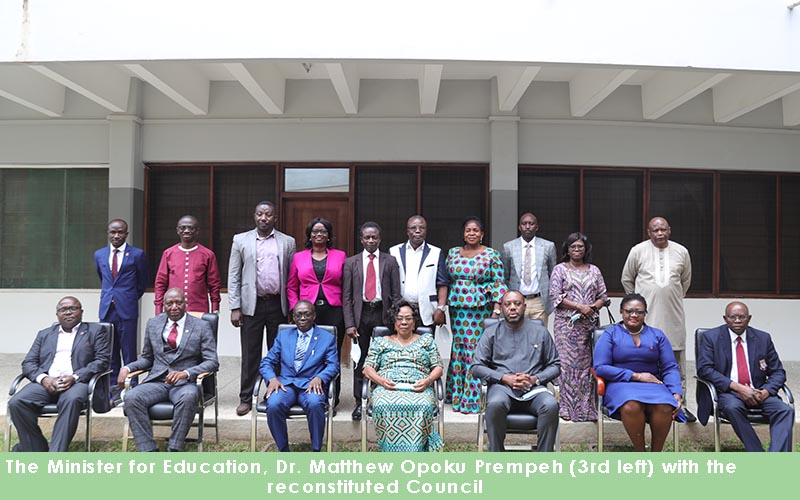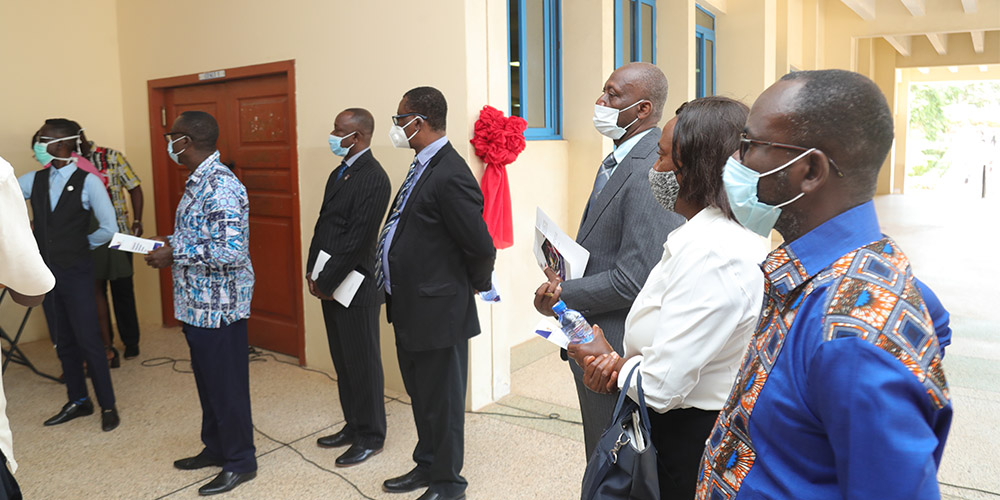COLLEGE OF EDUCATION STUDIES
INSTITUTE OF EDUCATION
SCHOOL OF GRADUATE STUDIES
SPECIAL POST-GRADUATE PROGRAMME
SALE OF APPLICATION SCRATCH CARDS/FORMS FOR ADMISSION TO REGULAR GRADUATE DEGREE PROGRAMMES (MPHIL/PHD) - 2020/2021 ACADEMIC YEAR
The Institute of Education, in collaboration with the School of Graduate Studies and College of Education Studies, University of Cape Coast, wishes to advertise Post-Graduate programmes for Tutors in the Colleges of Education in Ghana and interested persons who have M.A/M.Ed. and wish to pursue regular M.Phil/Ph.D programmes through special teaching and learning arrangement for the 2020/2021 Academic Year. The programme is planned to enable Tutors in the Colleges to pursue it without interference with their work schedules. Due to the COVID-19 pandemic, teaching and learning will be done through online (E-learning) and face-to-face modes. To facilitate the online (E-learning) mode, you will be required to have a smart phone or tablet or any device that allows you to connect to the internet. Concrete strategies/mechanisms have been put in place to enable all prospective students complete their programme of study on time.
Applications are invited from qualified persons for admission into the regular (Special) graduate programmes (MPhil/PhD) in the University of Cape Coast for the 2020/2021 academic year beginning November, 2020. Applicants are to access the admission brochure through https://sgs.ucc.edu.gh/sites/default/files/Brochure2020.pdf
Applicants are to buy an e-voucher which will enable them to apply online. The e-vouchers are up for sale at the centres listed below:
1.0 SALE CENTRES
(a) Cash Office, University of Cape Coast, Cape Coast. (Mode of Payment – CASH)
(b) University of Cape Coast Accra Office, Tesano, Accra. (Mode of Payment: Pay through GCB Ltd, Kaneshie Industrial Area Branch ONLY)
Bank: Ghana Commercial Bank, Kaneshie Industrial Area
Account NO.: 1201130006903
Account Name: Accra Guest House – University of Cape Coast
(c) Kumasi Workers College, Kumasi (Opposite Kumasi Technical Institute (KTI), Amakom, Kumasi) (Mode of Payment – CASH)
(d) Ghana Post Offices at the Regional and District Capitals. (Mode of Payment – POSTAL ORDER)
(e) I-J Consult, Apostle Dr. Baidoo Avenue (Off Pentecost Convention Centre Road), Millennium City, Kasoa (Mode of Payment – CASH)
(f) All UCC College of Distance Education (CoDE) Study Centres (Mode of payment: GCB Bankers Draft in the name of the The Registrar, University of Cape Coast)
1.1 COST OF E-VOUCHER: - GH¢320.00
NB: The deadline for the sale of e-voucher is Friday, 9th October, 2020.
Completed application forms should be returned on or before Friday, 9th October, 2020 to the address below:
The Deputy Registrar
School of Graduate Studies
University of Cape Coast
Cape Coast
For further enquiries, please contact us on:
Tel.: [03321] 32480 Ext 230, 237, [03321] 35351, 0207087976
E-mail: graduatestudies@ucc.edu.gh
NB: Indicate the name of your Institution or College at the back of the EMS envelope.
2.0 ENTRY REQUIREMENTS
Doctor of Philosophy (Ph.D.) programmes
Candidates seeking admission to Ph.D. programmes must:
-
Have an M.Phil. or research (M.A/M.Ed./M.Sc./MBA) degree in an appropriate field of study from a recognised university.
OR
-
Have M.A./M.Ed./M.Sc./MBA degree in an appropriate field, with CGPA of 3.5 or better with not more than one grade C+. Also, should have scored B+ or better in Research Methods course.
AND
-
All Non UCC Alumni are to submit an official transcript of academic record (UCC Alumni are to provide their registration number).
-
Submit at least three referee reports, one of which must be from a former Lecturer.
-
Submit a 3-5-page proposal on intended area of study including a working bibliography.
-
Satisfy any additional requirements prescribed by the College/Faculty/School/ Department (e.g. selection interview)
Master of Philosophy (MPhil) Programmes
Candidates seeking admission to M.Phil. degree programmes must:
-
Have obtained a good first degree (at least a second-class division) in an appropriate field of study from a recognised university/analogous institution.
OR
Non-research master’s degree (e.g. M.A/MEd/MSc) with CGPA of 2.5 or better.
-
All Non UCC Alumni are to submit an official transcript of academic record (UCC Alumni are to provide their registration number).
-
Submit at least two referee reports, one of which must be from a former Lecturer.
-
Submit a 2-3-page proposal on intended area of study including references.
-
Pass a selection interview.
-
Satisfy any additional requirements prescribed by the College/Faculty/School/Department.
3.0 DURATION AND STRUCTURE OF PROGRAMMES
Ph.D.: Three (3) years (36 Months)
The PhD programme shall consist of two parts. One year of course work/directed reading/proposal development and two years for thesis writing.
M.Phil.: Two (2) years (24 Months)
The M.Phil. Programmes shall consist of two parts. The first part shall consist of course work/directed reading/proposal development for one academic year (two semesters) and one year for thesis writing.
Non-research degree: One-year Top-up
Applicants with non-research degree (e.g. M. A/M.Ed./M.Sc.) with CGPA of 2.5 or better in an appropriate field of study may also apply for a one-year top-up. Such applicants will be made to take some courses (where needed) and write thesis.
4.0 Target Groups
-
Tutors in the Colleges of Education in Ghana
-
Persons seeking to teach in tertiary institutions
-
Heads of Public/Private institutions
5.0 GRADUATE PROGRAMMES AVAILABLE IN THE COLLEGES, FACULTIES, SCHOOLS, INSTITUTES, DEPARTMENTS
5.1 FACULTY OF ARTS
-
Department of Ghanaian Languages and Linguistics
M.Phil. (Ghanaian Language) - Akan/Ewe/Ga
The programme covers two areas of Ghanaian language studies, namely:
-
Language
-
Literature
Presently, the programme focuses on Akan, Ewe and Ga.
Additional Entry Requirements
Prospective applicants should
-
Have obtained a good First Degree (minimum Second Class Lower) from the University of Cape Coast or any recognised tertiary institution in
-
A Ghanaian Language, or
-
General Linguistics, with passed courses in the Ghanaian language of interest, or
-
A discipline equivalent to (a) or (b) above.
-
Pass a selection interview.
B. Department of English
-
Ph.D. (English Language)
-
Ph.D. (Literature-in-English)
-
M.Phil. (English Language)
-
M.Phil. (Literature-in-English)
C. Department of French
-
Ph.D. (Language and Didactics in French)
-
M.Phil. (Linguistics and Didactics)
-
M.Phil. (French Literature and Civilization)
-
M.Phil. (African Literature and Civilization)
5.2. FACULTY OF SCIENCE AND TECHNOLOGY EDUCATION
A. Department of Health, Physical Education and Recreation (HPER)
-
Doctor of Philosophy (Ph. D.) in Physical Education
-
Master of Philosophy (M.Phil.) in Physical Education
B. Department of Vocational and Technical Education (VOTEC)
-
M.Phil. (Home Economics): Clothing and Textiles
-
M.Phil. (Home Economics): Foods and Nutrition
-
M.Phil. (Home Economics): Family and Consumer Science
C. Department of Science Education
-
Doctor of Philosophy (Ph. D.) in Science Education
-
Master of Philosophy (M.Phil.) in Science Education
Options
-
Chemistry
-
Physics
-
Biology
Additional Entry Requirements
i. Applicants to the postgraduate programme should either be:
-
Holders of B.Ed. (Science Education) with preferably second-class lower division or higher from a recognised University or institution.
Or
-
Holders of B.Sc. (Hons) in a relevant science programme and a Postgraduate Diploma in Education (PGDE)
Or
-
Holders of research-based and non-research-based master’s degrees in Science Education (e.g. M.Ed.) from a recognised university.
ii. Applicants will also have to pass the selection interview for admission to the programme.
D. Department of Mathematics and ICT Education
-
Ph.D. (Mathematics Education)
Additional Entry Requirements
-
Applicants to the Ph.D. (Mathematics Education) programme should be holders of a two-year research master’s degree in Mathematics Education from the University of Cape Coast or an equivalent institution.
-
Applicants will have to pass a selection interview for admission into the programme.
ii. M.Phil. (Mathematics Education)
Additional Entry Requirements
Applicants to the Master of Philosophy (Mathematics Education) programme should be:
-
Holders of B.Ed. (Mathematics Education) or B.Ed. (Mathematics) or B.Ed. (Basic Education) Mathematics with second class lower division or better from a recognised university.
Or
-
Holders of B.Sc. (Hons.) in Mathematics or Mathematics related programme and a Postgraduate Certificate in Education (PGCE)/ Postgraduate Diploma in Education (PGDE).
In addition, a minimum of two years of teaching experience in Mathematics at the Basic School, High School or College of Education level will be required.
-
Applicants will also have to pass a selection interview for admission into the programme.
5.3 FACULTY OF HUMANITIES AND SOCIAL SCIENCES EDUCATION
A. Department of Business and Social Sciences Education (DOBSSE)
-
Doctor of Philosophy (Curriculum and Teaching)
-
Master of Philosophy (Curriculum and Teaching)
B. Department of Arts Education
-
Ph.D. (Arts Education)
Areas of Specialization:
History, English, French, and Ghanaian Languages.
Specific Requirement
Master’s degree in Arts Education – M.Ed. or MPhil (Arts) with a major in either English Language and Literature, French Language, Ghanaian Languages, or History,
-
M.Phil. (Arts Education)
Areas of Specialization:
History, English, French, and Ghanaian Languages.
Specific Requirements:
-
Bachelor’s degree in Arts - B. A or B.Ed. (Arts) with a major in either English Language and Literature, French Language, Ghanaian Languages, and History with a Diploma /Post-Graduate Certificate in Education/Post-Graduate Diploma in Education.
-
M.Ed. (Arts) Degree with a minimum CGPA of 2.5
5.4 FACULTY OF EDUCATIONAL FOUNDATIONS
A. Department of Basic Education
M.Phil. (Basic Education)
B. Department of Education and Psychology
-
Ph.D. (Measurement and Evaluation)
-
Ph.D. (Special Education)
-
Ph.D. (Educational Psychology)
-
M.Phil. (Measurement and Evaluation)
-
M.Phil. (Educational Psychology)
-
M.Phil. (Special Education)
-
M.Phil. (Sociology in Education)
C. Department of Guidance and Counselling
-
Ph.D. (Guidance and Counselling)
-
M.Phil. (Guidance and Counselling)
5.5 SCHOOL OF EDUCATIONAL DEVELOPMENT AND OUTREACH
Institute for Educational Planning and Administration (IEPA)
-
PhD (Educational Leadership)
-
MPhil (Educational Planning)
-
MPhil (Educational Administration)
-
MPhil (Administration in Higher Education)
5.6 SCHOOL OF AGRICULTURE
A. Department of Agricultural Engineering
-
Ph.D. (Food and Post-Harvest Technology)
-
Ph.D. (Irrigation Technology and Management)
-
M.Phil. (Food and Post-Harvest Technology)
-
M.Phil. (Irrigation Technology and Management)
-
M.Phil. (Agricultural Mechanisation)
B. Department of Animal Science
M.Phil./Ph.D. Animal Science with specializations in
-
Animal Breeding and Genetics
-
Animal Nutrition
-
Meat Science and Technology
-
Pasture and Range Management
-
Management of Livestock Enterprises
Admission requirements:
Ph. D.
A candidate seeking admission into the Ph.D. programme must:
Have an M.Phil. OR 2-year MSc degree in Animal Science OR Agricultural/Biological Sciences or Mathematics or Statistics OR Food Science OR Home Economics OR related field from a recognised University.
M.Phil.
A candidate seeking admission to the M.Phil. programme must have obtained a good first degree (at least a Second Class) in:
-
Agriculture for any of the specializations; OR
-
Statistics or Mathematics or Pure Sciences for specialization in Breeding and Genetics; OR
-
Management or Business or Natural Resources or Biological Science for specialization in Management of Livestock Enterprises; OR
-
Food Science, Biochemistry, Home Economics, Biological Science for specialization in Meat Science and Technology or Animal Nutrition.
C. Department of Crop Science
-
Ph.D. (Crop Science)
-
M.Phil. (Crop Science)
Areas of Specialisation:
Ph. D. /M. Phil (Crop Science)
-
Agronomy
-
Genetics and Plant Breeding
-
Crop Physiology
-
Plant Protection
D. Department of Soil Science
-
Ph.D. (Soil Science)
-
M.Phil. (Soil Science)
E. Department of Agricultural Economics and Extension
-
Ph. D. (Agricultural Extension)
-
Ph.D. (Agricultural Economics)
-
M.Phil. (Agricultural Extension)
-
M.Phil. (Agricultural Economics)
Specific Entry Requirements
Ph.D. (Agricultural Extension)
A research Master’s Degree in Agriculture and related courses from the University of Cape Coast or an accredited university.
Ph. D. (Agricultural Economics)
A research Master’s Degree in Agricultural Economics or a related field from the University of Cape Coast or an accredited university
M.Phil. (Agricultural Economics)
A good first degree in Agriculture with a significant amount of economics or with a specialization in Agricultural Economics from the University of Cape Coast or an accredited university.
5.7 SCHOOL OF BIOLOGICAL SCIENCES
A. Department of Conservation Biology and Entomology
-
M.Phil. (Entomology)
-
M.Phil. (Wildlife Management)
B. Department of Fisheries and Aquatic Sciences
-
M.Phil. (Aquaculture)
-
M.Phil. (Fisheries Science)
-
M.Phil. (Oceanography and Limnology)
-
M.Phil. (Integrated Coastal Zone Management)
C. Department of Environmental Science
-
M.Phil. (Environmental Science)
5.8 SCHOOL OF PHYSICAL SCIENCES
A. Department of Physics
M.Phil. (Physics) with options in:
-
Theoretical Physics
-
Environment Physics
-
Applied Fibres Optics and Communication
-
Meteorology and Atmospheric Physics
-
Radiation and Health Physics
-
Soil Physics
-
Photonics, Optoelectronics, Optical and Laser Application
-
Energy Physics
-
Electronics
-
Biomedical Optics
-
Material Science
B. Department of Chemistry
MPhil (Chemistry) with options in:
-
Analytical Chemistry
-
Organic Chemistry
-
Inorganic Chemistry
-
Physical Chemistry
C. Department of Mathematics
M.Phil. (Mathematics)
Entry Requirements for M.Phil. Mathematics
Candidates with a good first degree preferably first or second class (Hons.) from the University of Cape Coast or a recognised institution of higher learning may be considered for the programme in any of the following:
(A)
-
B.Sc. Mathematics
-
B.Sc. Mathematics with Economics
-
B.Sc. Mathematics with Business
-
B.Sc. Mathematics and Statistics
-
B.Sc. Mathematics and Computer Science
-
B.Ed. Mathematics
OR
(B) Other Mathematics related programme with a good mix of analysis courses.
REGISTRAR






 Registrar, some Provosts, Deans and student leaders at the inauguration of the Student Financial Support Office
Registrar, some Provosts, Deans and student leaders at the inauguration of the Student Financial Support Office

